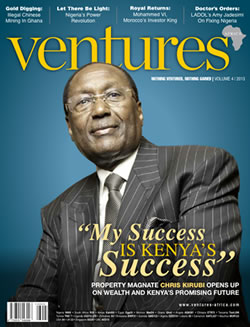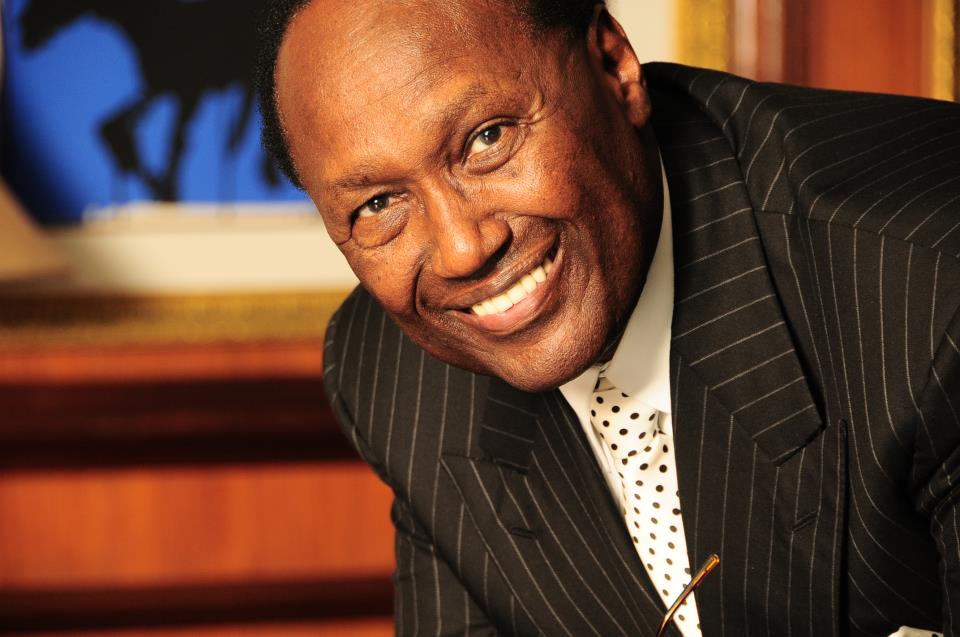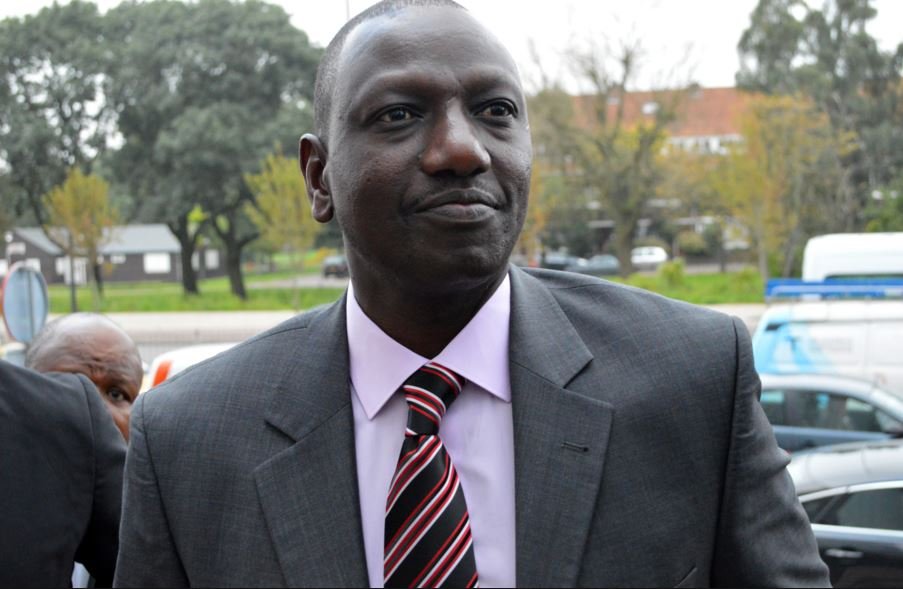Media Mogul Chris Kirubi Reveals the Source of His Extensive Wealth
Chris Kirubi is one man whose calls are picked by heads of States, thanks to the respect and financial muscle he has developed over the years. The media mogul is the muse for Ventures Africa magazine’s August/September issue.
Striking a fierce pose, the Capital FM and Haco Industries owner speaks candidly on his wealth and his promising future.
“My success is Kenya’s success”, he tells the mag.
Here’s his story;
Dr. Chris Kirubi is the quintessential Kenyan entrepreneur. A self-made businessman, he rose from poverty to create a multi-million dollar empire of property, investment, manufacturing and media companies. Today, he is well-known both in Kenya and internationally. Kirubi is the chairman and a shareholder of Haco Tiger Brands (a joint venture with Tiger Brands SA, listed on the Johannesburg Stock Exchange). He is also CEO of Capital FM and holds large equity stakes in Nairobi Stock Exchange listed investment firm Centum, UAP Insurance and the Kenyan franchise of DHL. Furthermore, he is a shareholder in Nairobi Bottlers, a bottling franchise for Coca-Cola.
Kirubi is remarkably taciturn about his past. “There is not much history. I was born a poor boy – an ordinary peasant, I would say. My parents passed on when I was young. But I was lucky to have people who supported my education,” he says. His first jobs helped him develop a sense of selfreliance. “When I was in school I worked during holidays to help myself and my brothers. My work experience therefore started many years ago. It builds confidence. It gives you experience as well. It teaches you at a very early stage how to take care of yourself. You learn a lot of discipline – how to manage your time, how to be transparent – and this was a good base for doing my own business. I apply this to whatever I do.”

After high school, Kirubi took up his first formal job with Shell as a sales rep. He moved swiftly through his graduate studies and positions in the pharmaceutical industry, the automotive industry and government before deciding to begin a new journey.
Building on a Property Foundation
That journey began with property development. Kirubi owns one of Kenya’s most iconic buildings, the International House in Nairobi – namesake and headquarters of International House Limited, his property investment firm. “Property was one of the easiest things to try to get into,” Kirubi explains. “Properties were not expensive as they are now. Today in Kenya it is almost impossible to buy. Back then, if you had a friend in the bank to support you it was easy to buy these assets. I used to buy neglected properties, do them up and flog them in the market. It was an area that there were not many people involved in, and it was a very profitable venture.”
Does he believe property is the backbone of his success? Not strictly. “It was a combination but property was where I began. I started on a good footing,” he says. “I was asked by a company to partner with them in manufacturing writing implements and was also trading with a Dutch company. But I got involved with the Dutch company because the MD stayed in one of my properties. We got to know each other and became good friends. With International House, I worked for [the insurance company that was headquartered there]. I used to sell policies and when they decided to close down their offices in Kenya, they offered me the opportunity to buy the building and supported me in talking to the banks and off we went. So property was always the foundation.
More Ups than Downs
From there, Kirubi built a diversified empire, and recalls only one defeat – a paint industries business. But even on the topic of failure, Kirubi is characteristically upbeat. “I didn’t understand the routes to market and couldn’t gain ground against the giants in the sector. But I learnt: you fail, you get up and you walk. You move on. I had the proceeds from the assets and some land that I still hold, so it wasn’t a total disaster,” he says.
His successes have been plentiful and on this point Kirubi can afford to be a little philosophical. “Success for me is not enumerated in wealth,” he says. “I have come to discover that money and material things are never quite sufficient; the goal post always shifts when you get there.” He returns to his typical pragmatism: “Success means being able to accomplish the goals I have set out for myself. If, for example, I have a goal to build a state-of-theart property, success comes in small doses. It is in seeing the milestones we have achieved with completion of every construction step and finally being able to open up the building for occupation. More so, it extends to having a 100-percent occupancy rate of satisfied clients. When that happens, I can say I feel successful in that angle.”
His biggest success, he believes, was his transition from a position of poverty to that of employer, shepherding himself ”from the very poor world to a world where I am able to create jobs and create opportunities” for fellow Kenyans. “My success is Kenya’s success. I have lots of people working for me in the various companies I have. From being poor, I am now a job creator, creating lives for other people.”
Managed Interventions
Kirubi has developed a reputation for turning around failing businesses, Capital FM being an exemplary case. “Capital FM was almost dead. They were not paying their bills, the staff was demotivated. It was struggling in the market place,” Kirubi says. “But I saw an opportunity. I realised that what was missing was focused management. The company was concentrating on a narrow band of expat listenership.”
The beleaguered radio station might not have seemed a viable investment to many, but to Kirubi it was an opportunity. “I like buying things that are not well managed and turning them round, because I know the one thing I can put into a business is management. Within a few years, we turned it around, widened the base of listenership, brought in younger Kenyans to be presenters and I myself went on air – I got involved to make sure that people had contact with me.”
The opportunity was twofold. “I really thank Capital very much because I had lots of products to promote and I was paying a lot of money in advertising. So I thought, why don’t I buy the media itself?” he says jovially, before adding on a serious note: “It became my life. When you get into media, it’s hard to get out.”
A Diversified Portfolio
How has he managed to build success in so many diverse sectors? “Regardless of the sector, being successful requires first and foremost that you understand your market,” he answers. “When I first got into media, I faced numerous challenges in trying to understand the market, its needs, the skills required and the peculiarities of the industry. I had to do my research and practically submerge myself in the industry by becoming a DJ in order to understand the market. Only then could I make proper and effective decisions.”

Knowing your market is just one item on a shopping list of attributes and virtues that Kirubi feels help create success. “You need to have a vision, be passionate about it, build a credible brand and have tenacity, especially when the trials seem to be more than the successes,” he advises. “Obviously this list is not exhaustive but success requires you to put in hard work.”


